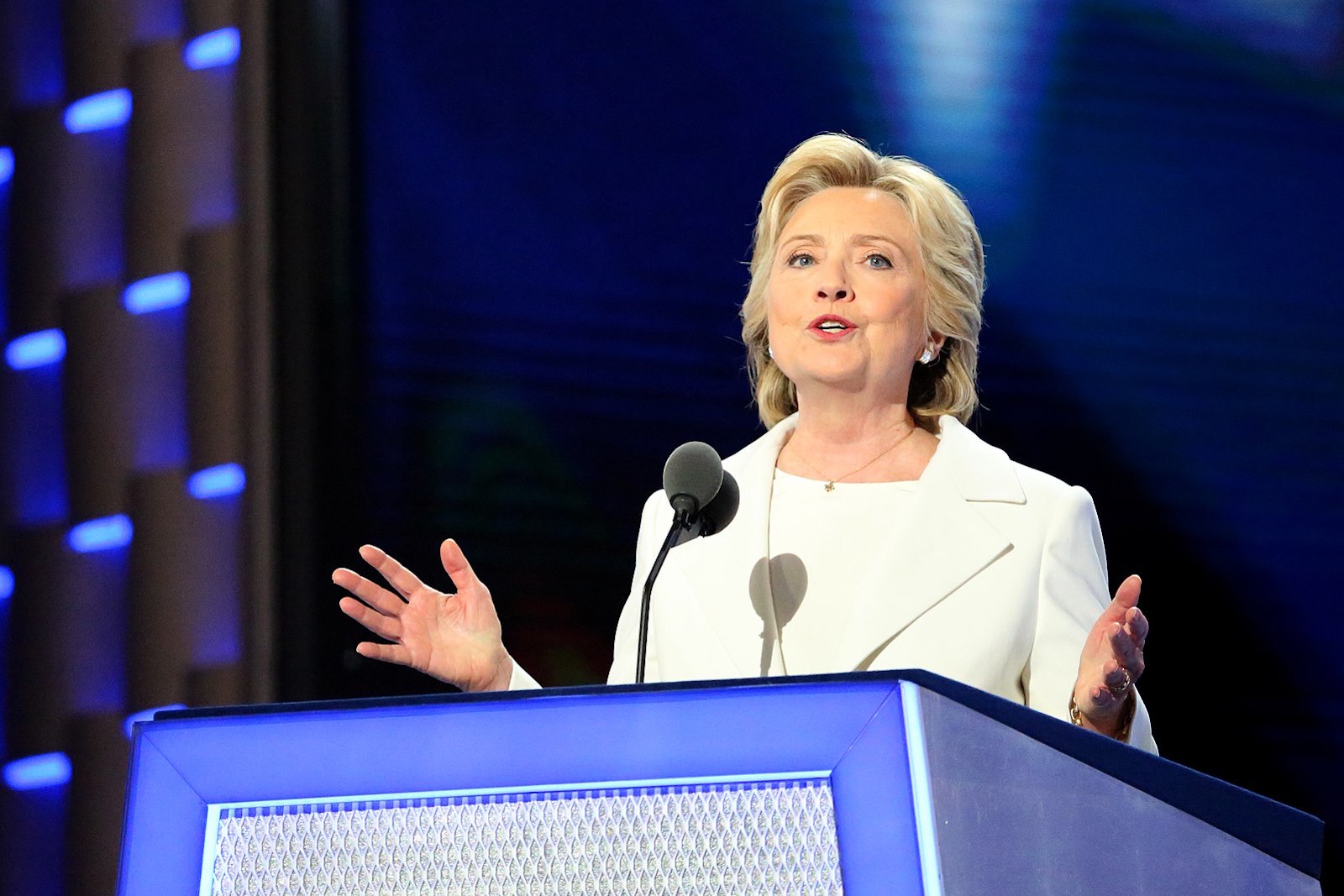Professor of Communication’s New Book Examines Hillary Clinton’s Rhetorical Adaptability
October 19, 2023

Shawn J. Parry-Giles’ “Hillary Clinton’s Career in Speeches” suggests sexism in politics turns women’s rhetorical strengths into political liabilities.
By Jessica Weiss ’05
As Hillary Clinton campaigned for president against Donald Trump in 2016, various aspects of her persona were picked apart and criticized. Among them: her speech-giving. Compared to a bombastic Trump, the media described Clinton as a wonk, a technocrat—even wooden.
Professor of Communication Shawn J. Parry-Giles, who has spent decades studying Clinton’s rhetoric and the media coverage of her, wanted to better understand if and how Clinton’s speaking influenced her candidacy. Together with David S. Kaufer, Mellon Distinguished Professor of English at Carnegie Mellon University, and Xizhen Cai, assistant professor of statistics at Williams College, Parry-Giles has published a new book that explores the politician’s speeches, ultimately showing that Clinton was actually far more personable than wonkish during the campaign against Trump.
“Hillary Clinton’s Career in Speeches,” published last month by Michigan State University Press, analyzes Clinton’s two-and-a-half decades of public speaking on the national stage, as well as speeches by her presidential opponents and other Democratic women who ran for president in 2020. To research the book, the authors employed text-mining software—developed by Kaufer and colleagues over the span of decades—to pull data about the language and arguments used in some 1,000 speeches, such as whether the speakers’ prose was more highly “technical” or highly “personal.” The authors used statistical methods to compare and rank the speeches according to different variables that guided their rhetorical analysis.
While the authors conclude that Clinton far outpaced others in her “rhetorical adaptability,” or ability to adapt her speaking to a specific audience, they suggest that, for women, such adaptability can be a liability. We recently spoke to Parry-Giles about some of the main takeaways from her book and the insights it provides as another election cycle looms.
Hillary Clinton is often characterized as someone who speaks mostly about policy. But you and your co-authors show she actually has a lot of range.
Absolutely, she is highly adaptable in her speaking. It really varies across roles, contexts, genres and audiences. She was more personal as First Lady and Secretary of State. As Senator she was much more technical as she was dealing a lot with policy.
Can you give us an example?
As First Lady in 1994, she spoke to military wives and there's a great juxtaposition between the first half of the speech and the second half. The first half she's building bonds with these military wives and military leaders by talking about how hard it is to move with children and pets and telling stories about moving their cat Socks into the White House and how stressful it is. But there's a moment in the speech that she shifts and basically starts talking to these women about how they have such an important place in forging support for healthcare policy. At the time, the Clinton administration had put forward a major healthcare bill and there was a debate going on. And in trying to get them on board with a healthcare plan she gets very technical.
There are a lot of reasons people have given for Clinton’s loss in 2016. Some said she was a horrible speaker and could not connect. Did you find data about her speeches that reinforce this idea?
The conventional wisdom was in tension with our findings. We were able to see that when she ran for president in 2008, she was both wonkish and personal. But by 2016 she had dropped a lot of the technical vocabulary and she was just really trying to be relatable. I think she was forced into that. We drew the conclusion that women's opponents use the likability issue against some as an anti-woman stereotype that they can use to defeat women. So, if a woman is too wonkish, then they're not relatable. If they're too relatable, they're not smart enough and they're not going to be perceived as very credible. It’s a no win. As a woman, Clinton’s adaptivity seemed to be taken up by her critics as another sign of her inauthenticity.
On that note, you also compared Hillary's speeches in 2016 to four Democratic women senators who ran for president in 2020: Kamala Harris, Amy Klobuchar, Elizabeth Warren and Kirsten Gillibrand. Did you find similarities in their speeches?
On the campaign trail we see that women had to be both personal and technical in the same speech. To appear presidential, women have to build a technical vocabulary and an ability to speak credibly about complex policies. But if they only show their wonkish side, they’re seen as weak presidential candidates because they aren’t likable or relatable. If they elevate their likeability and relatability by also using engaging and personal language, they may be dismissed as unpresidential. Men just don’t have to manage that line in the same way.
As another presidential election cycle approaches, what sort of insight does your research provide for us?
I think we have to be mindful of criticisms of women; oftentimes women face a bigger critique. It’s easy to fall into such patterns because we've never had a woman president. Men are given more credibility in certain contexts because of what we're used to as empowering speakers. And men can create a sense of emotion and connection even without engaging language. When you find yourself thinking you don’t like something a woman has said, you have to stop yourself and think about it and ask why.
Ultimately, we think our research findings are hopeful, because our leaders should be able to be both personal and technical. And women know how to do that. We've had to do it.
Photo credit: Ali Shaker/VOA, Public domain, via Wikimedia Commons.

